Search Results
Monthly reserved parking available now at many BART stations
Rather than driving all the way to work and dealing with the stress of traffic, here are stations where you can reserve monthly parking and ride BART instead. This is the list of stations with monthly reserved parking available as of Monday, Nov. 2, 2009. Availability is subject to change and there may be
BART hosts first of two interactive career fairs
BART hosted the first of two interactive career fairs Wednesday, February 26th at North Berkeley Station, featuring dozens of job and internship opportunities as well as hands-on experiences to learn about careers at BART and its community partners.
Job seekers of all backgrounds are encouraged to attend the fairs to explore internship learning opportunities currently posted.
The BART Police department, with over a dozen vacancies for entry level police officer and police dispatchers, hosted activity stations at North Berkeley to educate attendees about different roles within the department, including an agility wall, a dummy drag, and an evidence van demonstrating fingerprinting techniques.
On the maintenance side, activity stations offered hands-on demonstrations such as full-size replica train tracks and power washing.
BART’s Talent Recruitment Team offered a special course on “How to Successfully Apply for a BART Job” to teach attendees about the application process.
The first event was held in a parking lot at North Berkeley Station from 10 am to 2 pm February 26th.
A second career fair is scheduled for Thursday, March 6th at Concord Station during the same hours.
An Affordable Housing and Sustainable Communities Program grant funds the career fairs. It’s part of California Climate Investments, a statewide program that puts billions of Cap-and-Trade dollars to work reducing greenhouse gas emissions, strengthening the economy and improving public health and the environment — particularly in disadvantaged communities.
Service restored after North Berkeley BART equipment problem
Service has been restored on BART following an equipment problem that resulted in the suspension of service between the North Berkeley and El Cerrito Del Norte Stations on Wednesday evening. A report of a possible fire on trackway north of the North Berkeley Station was received around 6:47 p.m., but no
BART Board schedules Fiscal Year 2016 budget meetings
The BART Board has set the following calendar for discussion and adoption of the Fiscal Year 2016 Budget: May 14, 2015, 9:00 am: Preliminary Budget Overview: Sources, Uses, and Service Plan May 28, 2015, 5:30 pm: Public Hearing on FY16 Budget Resolution to Adopt FY16 Proposition 4 Appropriations Limit FY16
BART Board approves contract for new fare gates systemwide to enhance safety and improve access
May 26, 2023 update
BART and STraffic officials signed a Notice to Proceed on May 19, 2023, authorizing STraffic to formally start the project. STraffic staff will be working on the project at BART headquarters in Oakland.
April 13, 2023 update
The BART Board officially approved the contract to STraffic America on April 13, 2023. View the presentation, which includes early concept renderings.
Posted on March 23, 2023
BART is moving forward with a historic purchase of brand-new fare gates to be installed systemwide as part of its latest effort to win riders back and overhaul safety in the system. The new fare gates will bring a new look and improved experience, offering state-of-the-art technology that will boost safety by reducing fare evasion, enhancing access for people in wheelchairs and those who bring bikes and strollers on BART, and optimizing the reliability and maintenance needs of the fare gates.
At the March 23, 2023, BART Board of Directors meeting, staff recommended the Board move forward with the first purchase of the $90 million Next Generation Fare Gate project. Staff recommended awarding up to $47 million to STraffic America to implement the project. BART staff will develop an installation timeline with STraffic and will stress-test the new fare gate design at a yet-to-be-determined station later this year. The project calls for all stations to have new fare gates by end of 2025. A prototype of the new fare gates will be installed at the West Oakland Station by the end of calendar year 2023.
The new fare gates will look unlike any other of the current 700 fare gates in the BART system. While the new design has not yet been finalized, the gates will have clear swing barriers that will be very difficult to be pushed through, jumped over, or maneuvered under. The overall fare gate array height (gate, console, integrated barrier) will form a tall barrier of 72” minimum to prevent fare evasion.
The next generation fare gates will not have the orange fins riders have become accustomed to. They will also be different than the new swing-style fare gates designed by BART staff and recently installed to enclose elevators into the paid area.
The new gates will be able to handle large crowds without slowing people down as they move in and out of stations while processing their Clipper cards. The gates will have advanced 3D sensors that are able to detect if someone is in a wheelchair or has a bike, stroller, or luggage with them, allowing for more time before the swing barrier closes. The gates will have LED lighting on the swing barriers and the pathway through the gate to help visually impaired riders. STraffic has worked extensively with members of the ADA community and is committed to continue this work while designing the BART gates.
“New fare gates will transform the rider experience and will deliver immediate improvements to safety and reliability,” said BART Board President Janice Li. “BART researched world-wide best practices in fare gate designs to help guide this pivotal purchase. I want to thank the local, state, and federal funding sources who have stepped up to support this impactful project. I am committed to seeing this project fully funded and fully implemented without delay.”
To date, BART has secured $73 million of the $90 million project, with funding from:
- BART Funds (Operating-to-Capital Allocations and Measure RR) $23M
- County Transportation Agency Funds $28M
- Federal Funds $15M
- State Funds $6.5M
In recommending the vendor, BART staff evaluated proposals from industry leaders and scored each proposal on their technical approach, qualifications, experience in delivering similar projects, and price. STraffic America, LLC offered the best value to BART and committed to subcontracting 11% of the work to Disadvantage Business Enterprises.
BART trains now deep-cleaned twice as often
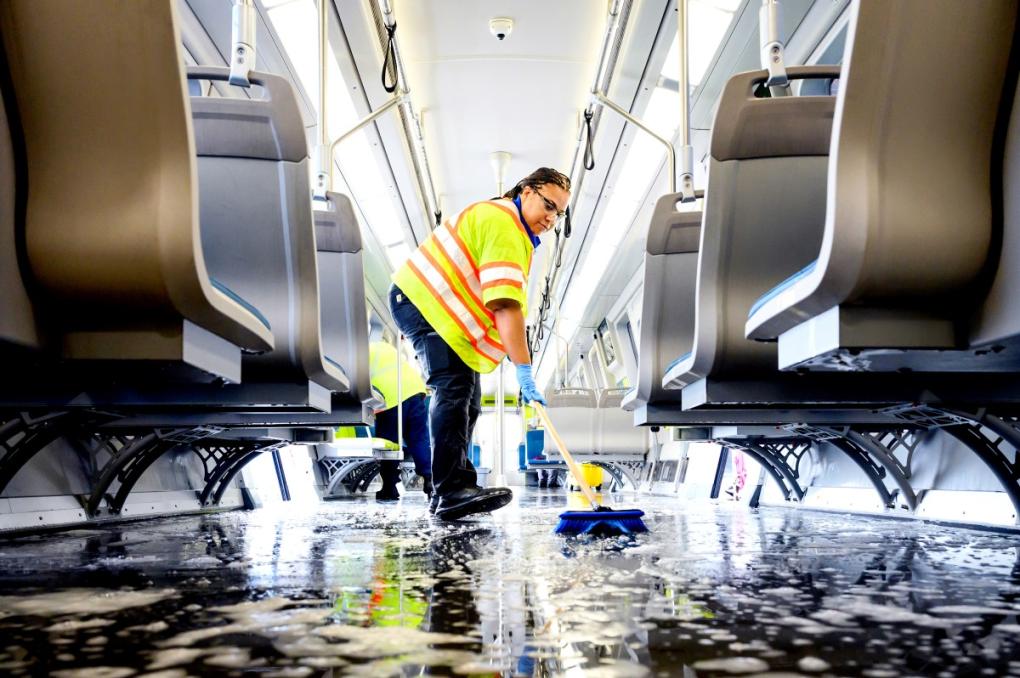
Train car cleaner Alyssa Barnes mops the floor of a BART car with disinfectant soap and steaming hot water during a train car thorough clean.
Glossary of BART Train Car Cleaning Terms
Thorough Clean | Standard Clean |
Litter Pickup
|
| A controlled multi-step clean that requires cleaners scrub every surface of a train car, from ceiling to baseboards. Thorough cleans take two cleaners about two hours to complete. They occur every 450 hours a car is in service. | If a car is not scheduled for a thorough clean on a given night, it will get a standard clean. Depending on time constraints, cleaners may sweep cars for debris, disinfect seats and poles, scrub graffiti, spray hanging straps with disinfectant, and mop the floor. | Between thorough and standard cleans, cleaners hop aboard train cars at the end of the line and sweep up litter and messes. If a car has a major mess, it will be removed from service and cleaned before it is returned to service. |
Note: It is impossible to Thorough Clean the 636 cars we require to run service every single night.
Rose Burditt, the foreworker who oversees overnight train car cleaning at Daly City Yard, inspects every single car that rolls into and out of her zone – up to 100 cars a shift. In just one night, she walks more than a mile in search of spots and stains that require some extra scrubbing from her team of skilled cleaners before she’s ready to release a car into passenger service.
Burditt, who started as a car cleaner herself 28 years ago, is her cleaning team’s “second set of eyes.” Her job is to ensure the cleaners scrub every surface of their assigned cars, from the ceiling to the baseboards, during one of their regular train car “thorough cleans” – the term we use to refer to a very, very deep clean not dissimilar from getting your automobile “detailed” at a car wash. A thorough clean takes a team of two around 120 minutes to complete, depending on the mess they face. Across the system each night, BART cleaners perform 15 to 20 thorough cleans – upwards of 30 hours of deep cleaning a night!
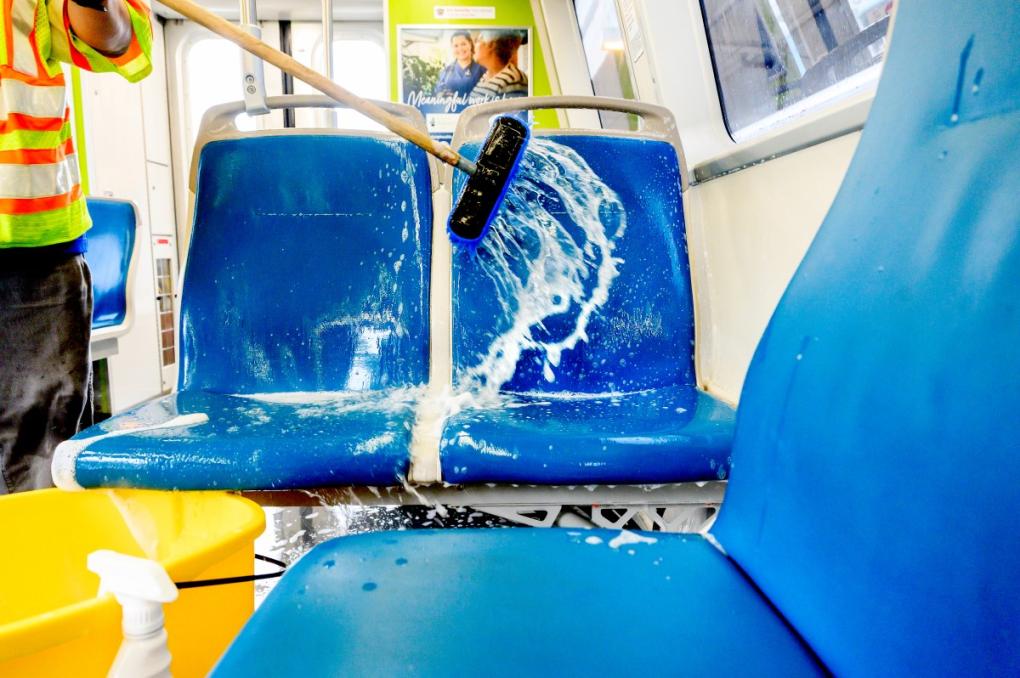
Seats are scrubbed with hot water and disinfectant soap during a thorough clean.
BART recently increased the frequency of thorough cleans from every 900 hours of train car service to every 450 hours, meaning we’ve doubled the number of times the cars in our system undergo a deep clean. You could say our train cars are now twice as clean.
They don’t make giant Roombas for our trains; cleaning our vehicles requires trained, dexterous, and highly skilled cleaners with close attention to detail. We’ve been able to increase our cleaning hours recently thanks to emergency federal funding and the knowledge that we’ll be receiving additional funds from the new state budget. This funding enables us to hire additional cleaners; the more cleaners on staff the more trains we can scrub at a greater frequency.
BART’s Rolling Stock and Shops department – the group that oversees train cleaning – has been ISO 9001:2015 certified since 2018, meaning our quality management system for maintaining cars lives up to the International Standards Organization’s high bar. We are one of the few transit agencies to have this prestigious certification and are sometimes surprise-audited by quality assurance officers who ensure our cleaning crews are following the required procedures.
No international standard could possibly be higher than Burditt’s own, however. If a car isn’t clean, it will not pass her eagle-eyed inspection.
“I don’t just work here, I ride the trains, too,” she said. “And I want a clean ride for passengers and myself.”
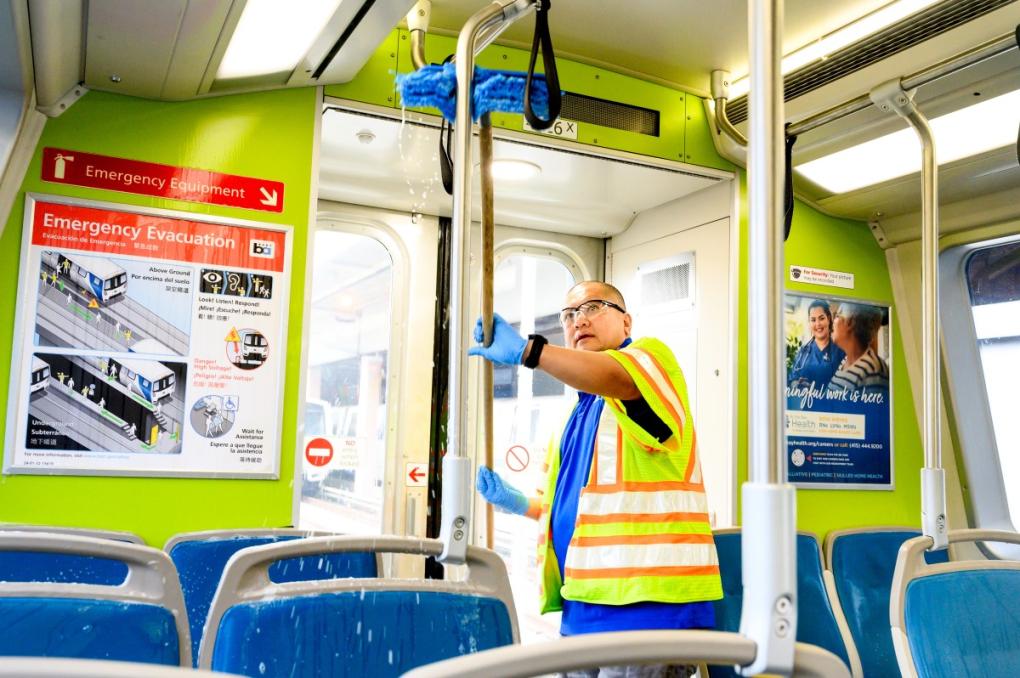
Train car cleaner Rodelio Correa scrubs the ceiling and poles with hot water and disinfectant soap during a thorough clean.
Trains are cleaned after every single trip they take, multiple times a day; at the end of each line, crews hop aboard to remove litter and messes. If a car is not scheduled for a thorough clean on a given night – it’s impossible to spend two hours cleaning the 636 cars we require to run service every single night – the car will undergo a “standard clean.”
The standard clean procedure varies depending on the car’s needs and time constraints. Often, two cleaners will sweep the car for debris, disinfect seats and poles, scrub away graffiti, spray hanging straps with disinfectant, and mop the floor. Cleaners use hospital-grade disinfectant that’s safe for humans but tough on germs (it smells nice, too).
To complete a thorough clean – and pass a foreworker's tough inspection – every scrub team must follow a 12-step, 34-page controlled procedure that is regularly updated and revised.
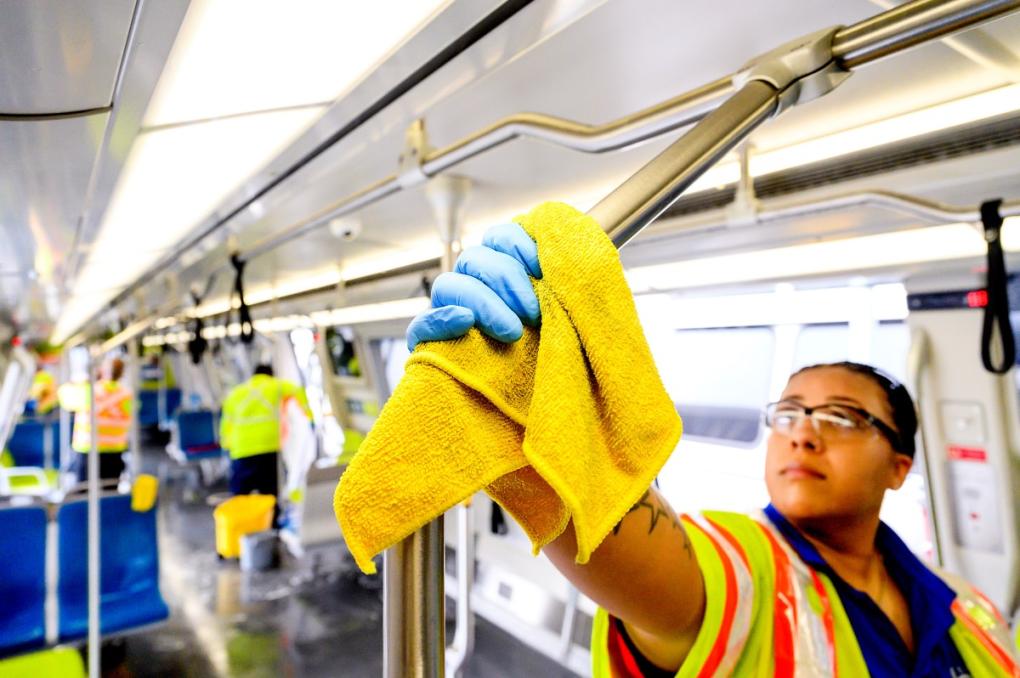
Train car cleaner Alyssa Barnes wipes down a pole on a BART car with disinfectant during a thorough clean.
Cleaning teams ferry their supplies with them from car to car on carts, which are outfitted with everything they might need – from water barrels and pic-sticks to gum and graffiti removers.
BART’s train car cleaners undergo regular trainings. In addition to a weeklong Roadway Worker Protection (RWP) course, cleaners receive training on how to handle nuanced situations, including the removal of biohazards. They also take courses on Arc flash safety, personal protective wear, and the proper procedures for working with certain cleaning products. Biohazards are an unfortunate reality on our trains, and cleaners are trained to never pick up litter with their hands but to always use pic-sticks.
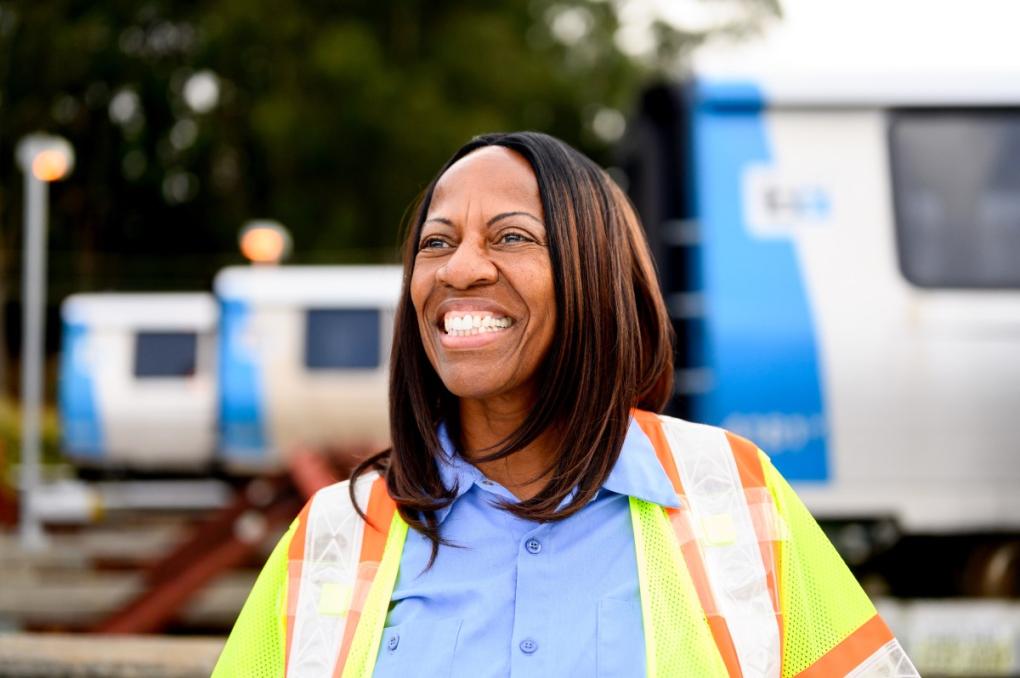
Rose Burditt, pictured above, started at BART 28 years ago as a train car cleaner. She now oversees the cleaning teams on the overnight shift at Daly City Yard as a foreworker.
“There’s more that goes into cleaning these trains than you might think,” said Burditt.
Most of all, Burditt wants riders to understand that when they leave a mess behind, there is a human being at the end of the line who has to take care of it.
“When you’re riding the trains, please consider the rider who’s taking the train after you,” Burditt said.
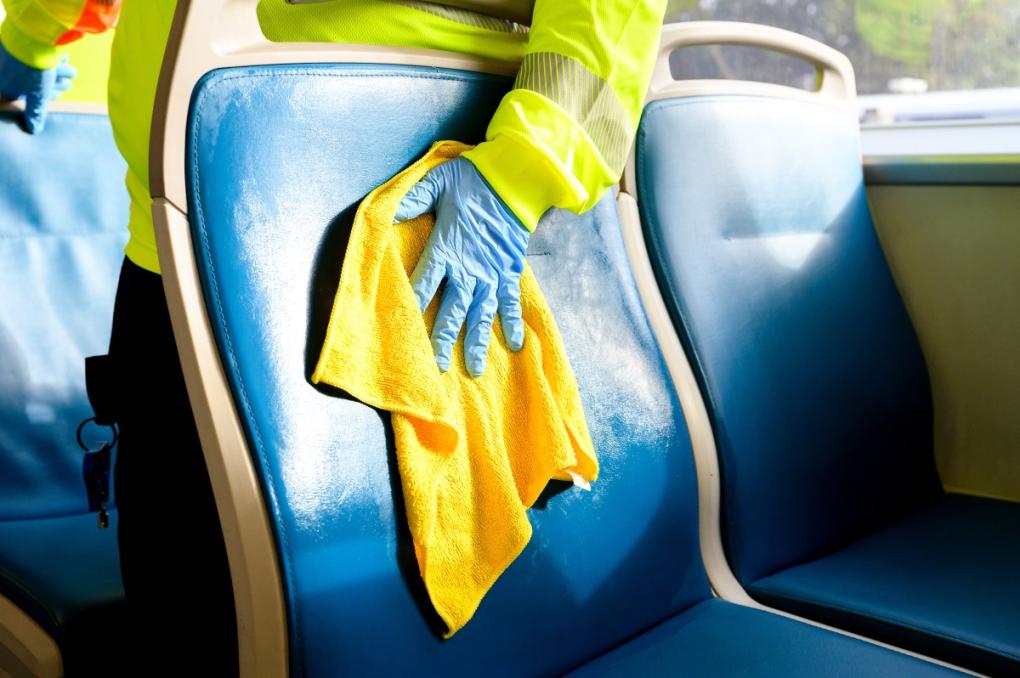
A seat is dried after being scrubbed with disinfectant soap and hot water during a thorough clean.
Our riders can help keep BART clean. At the end of your ride, pick up your trash and toss it in one of our station receptacles. Leaving junk on BART is littering and subject to fines.
Notice a biohazard on a train or in a station? Report it at bart.gov/biohazard.
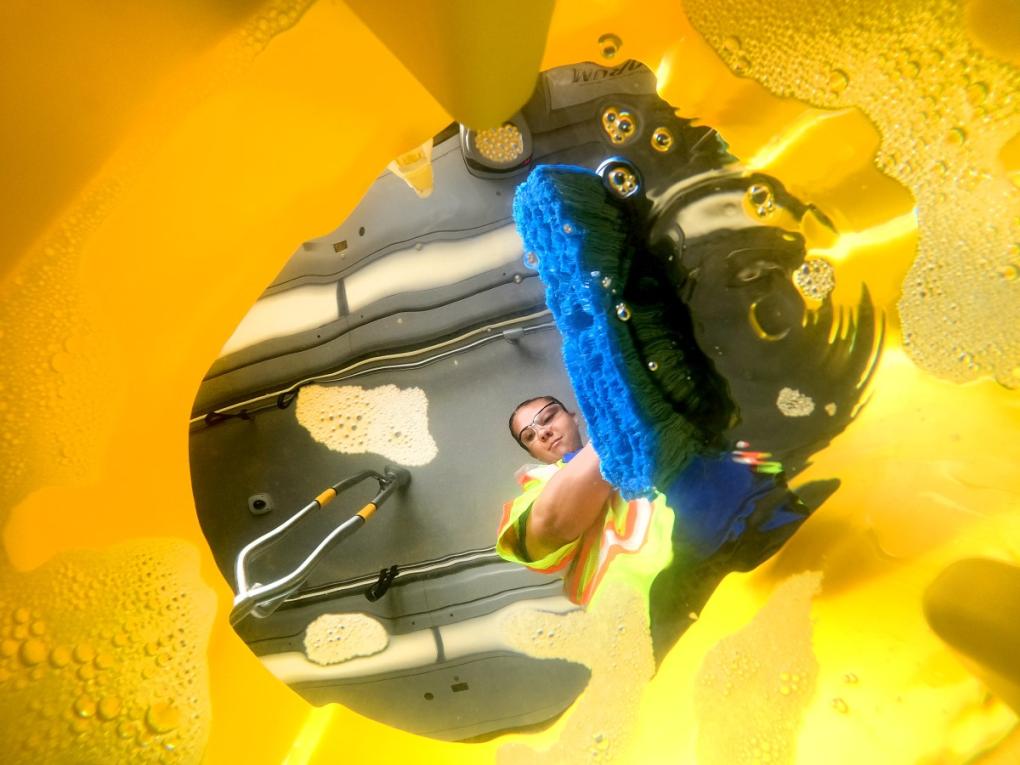
Train car cleaner Alyssa Barnes is pictured through a bucket of soapy water during a thorough clean.
BART Board schedules Fiscal Year 2015 budget meetings
The BART Board has set the following calendar for discussion and adoption of the Fiscal Year 2015 Budget: May 8, 2014, 9am: Preliminary Budget Overview: Sources, Uses, and Service Plan May 22, 2014, 5pm: Public Hearing on FY15 Budget Resolution to Adopt FY15 Proposition 4 Appropriations Limit FY15 Notice of
BART Police release image of Fruitvale Station stabbing suspect
The BART Police Department today released images of a suspect being sought in connection with a stabbing that took place onboard a train at the Fruitvale Station on Friday afternoon. The incident happened at 2:48 pm on March 22, 2019. The pictured suspect was involved in a fight with another male on a
BART Board eases commute bike restrictions for extended trial
The BART Board of Directors voted tonight to modify existing commute period bike rules for an extended 5 month trial period from July 1-December 1, 2013. The move represents the next phase of testing to observe the impact of allowing bikes on board during busy commute periods. Starting July 1, bikes will be